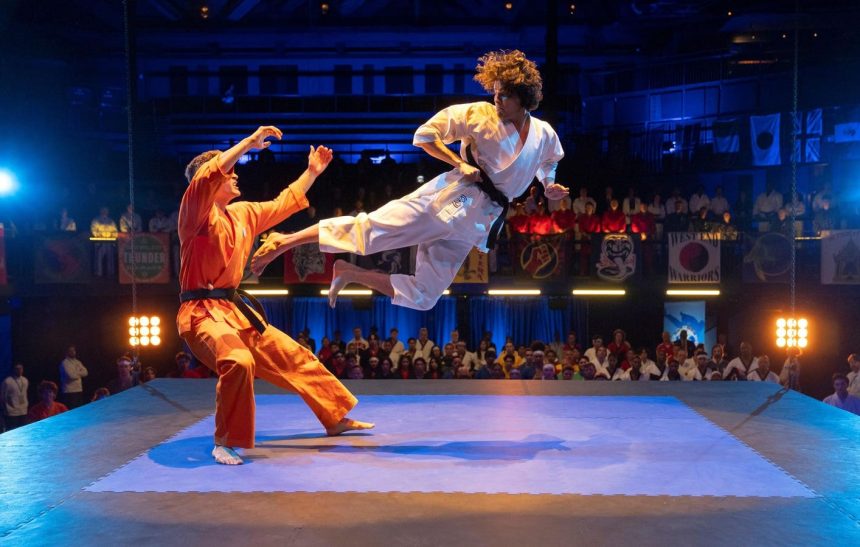The streaming landscape has become increasingly saturated, making it challenging for series finales to garner the attention they once received. In today’s media environment, shows must now rely on an array of cameos, climactic plot twists, and cliffhangers to capture their audience’s interest. “Cobra Kai,” the continuation of the beloved “Karate Kid” franchise, exemplifies how a series can successfully navigate this space by not only bringing nostalgia to its viewer base but also leveraging modern comedic elements. Recently, the show has seen a remarkable resurgence in media coverage and viewership, culminating in a season finale that made waves in both the entertainment industry and among fans.
Originally launched in 2018 as a YouTube Premium series, “Cobra Kai” took its inspiration from the cult classic “Karate Kid” films of the 1980s. The original film told the story of Daniel LaRusso, a timid teenager portrayed by Ralph Macchio, who finds his footing through karate lessons from Mr. Miyagi, played by Pat Morita. Departing from the muscle-bound action heroes of its time, “Karate Kid” resonated with audiences due to its relatable protagonist and authentic performances, grossing over $91 million at the box office. Despite spawning multiple sequels and a 2010 remake, the franchise’s allure diminished over the years, leading to concerns about the viability of reviving it in a contemporary setting.
Rather than modernizing the narrative, “Cobra Kai” embraced the spirit of the original film, featuring familiar characters like Johnny Lawrence (William Zabka) as a washed-up adult trying to revive his life through karate. This fresh perspective allowed the series to explore the rivalry between LaRusso and Lawrence in a tongue-in-cheek manner, reflecting on their past while allowing for new comedic twists. This clever blend of nostalgia and humor made the series accessible to both longtime fans and newcomers, contributing to its perfect score on Rotten Tomatoes for the first season. After moving to Netflix, the show regained momentum, with its ratings consistently remaining above 90% across five seasons, thanks in part to a mix of character cameos and escalating conflicts.
With the sixth season split into three parts, anticipation surged for its conclusion, which is set for release in February 2025. This final chapter has seen an evolution in character dynamics, with collaborations between rivals who must confront returning villains from previous installments, including the notorious Terry Silver. Moreover, the creative use of deepfake technology allowed the late Pat Morita to make an eerie return as Mr. Miyagi in a significant storyline reveal. However, critics have noted a slight decline in quality, as reflected in the season’s Rotten Tomatoes score of 85%, with some suggesting it “doesn’t hit as hard” while still maintaining its core appeal.
Cobra Kai’s media presence has been nothing short of impressive, securing its place at the forefront of cultural conversations. According to data from Factiva, “Cobra Kai” received extensive media coverage, topping mention counts with 3,787 articles this year alone—outpacing other popular series including “Arcane.” In terms of Netflix viewership, while it occupies the third position behind another popular comedy, it has emerged as a cultural phenomenon, indicating its significant impact on both viewers and the industry alike. The strategic seasonal releases have not only increased its visibility but have also prompted dynamic discussions around the show’s ongoing legacy.
As the series heads toward its conclusion, the anticipation builds not only for the resolution of existing storylines but also for the future of the franchise. Following the end of “Cobra Kai,” audiences can look forward to “Karate Kid Legends,” a theatrical installment set to bridge the narrative gap left by the series. With both Macchio and Jackie Chan set to star, there is considerable expectation that the movie will capitalize on the momentum generated by the show. The success of “Cobra Kai” could serve as a powerful promotional tool, potentially drawing in fans and solidifying the “Karate Kid” legacy that began over four decades ago. As it stands, “Cobra Kai” exemplifies modern storytelling that can leverage nostalgia while adapting to the evolving entertainment landscape.



